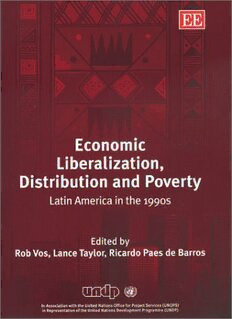
Economic Liberalization, Distribution and Poverty: Latin America in the 1990s PDF
463 Pages·2003·1.106 MB·English
Most books are stored in the elastic cloud where traffic is expensive. For this reason, we have a limit on daily download.
Preview Economic Liberalization, Distribution and Poverty: Latin America in the 1990s
Description:
Since the late 1980s, almost all Latin American countries have undergone a series of far-reaching economic reforms, particularly in the areas of financial and capital account liberalization and trade. This book provides a comparative and analytical framework for assessing the impact of these reforms upon 16 countries in Latin America and the Caribbean, including: Argentina, Brazil, Chile, Colombia, El Salvador, Ecuador, Mexico, and Peru. The contributors analyze the complex interaction between macro policies, trade and financial liberalization. They illustrate that capital account liberalization in many cases has counteracted objectives of trade liberalization by provoking real exchange-rate appreciation and a profit squeeze in tradable goods sectors. The book concludes that structural shifts resulting from the reform process - such as greater demand for skilled labor and labor-saving investments in modern economic sectors - are major underlying causes of inequality and poverty. The authors ascertain that although these repercussions are strongly associated with the process of trade liberalization, in several instances the positive impact of macroeconomic stabilization and expansion of aggregate demand on employment and real incomes have counteracted these negative outcomes. Economic Liberalization, Distribution and Poverty will be of interest to scholars of economic development, policymakers in countries undergoing major economic reforms (Latin America, Africa, Asia and Eastern Europe), economic analysts at multilateral agencies (UN, IMF, World Bank, regional development banks, BIS), and international investment agencies including major banks. The book will also be important to aid agencies and those interested in a better understanding of the impact of globalization on the well-being of people across the globe.
See more
The list of books you might like
Most books are stored in the elastic cloud where traffic is expensive. For this reason, we have a limit on daily download.
